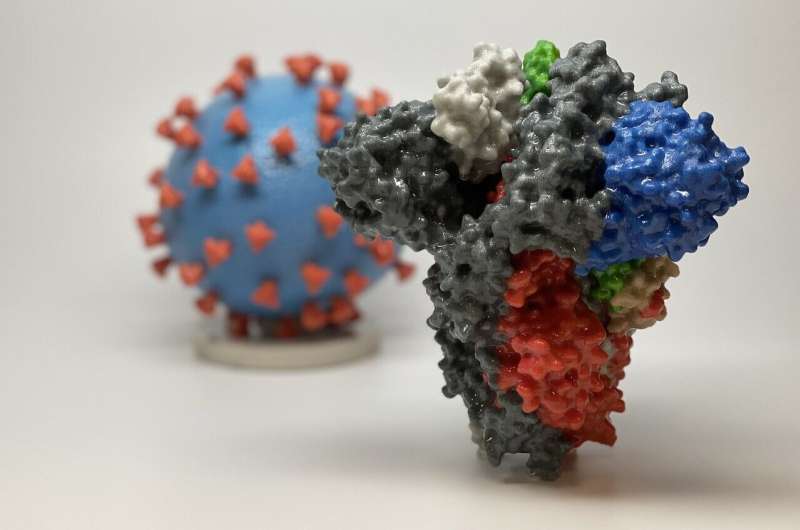#S.Africa virus strain poses ‘re-infection risk’: study

“#S.Africa virus strain poses ‘re-infection risk’: study”

The coronavirus variant detected in South Africa poses a “significant re-infection risk” and raises concerns over vaccine effectiveness, according to preliminary research Wednesday, as separate studies suggested the British strain would likely be constrained by immunisations.
Several new variants—each with a cluster of genetic mutations—have emerged in recent weeks, sparking fears over an increase in infectiousness as well as suggestions that the virus could begin to elude immune response, whether from prior infection or a vaccine.
These new variants, detected from Britain, South Africa and Brazil, have mutations to the virus’ spike protein, which enables the virus to latch onto human cells and therefore plays a key role in driving infections.
But it is one mutation in particular—known as E484K and present in the variants detected in South Africa and Brazil but not the one from Britain—that has experts particularly worried about immunity “escape”.
In a new study, which has not yet been peer reviewed, researchers in South Africa tested the variant found there—called 501Y.V2—against blood plasma from recovered COVID-19 patients.
They found that it was resistant to neutralising antibodies built up from prior infection, but said more research was needed into the effectiveness of other parts of the immune response.
“Here we show that the 501Y.V2 lineage, which contains nine spike mutations and rapidly emerged in South Africa during the second half of 2020, is largely resistant to neutralising antibodies elicited by infection with previously circulating lineages,” the authors said.
“This suggests that, despite the many people who have already been infected with SARS-CoV-2 globally and are presumed to have accumulated some level of immunity, new variants such as 501Y.V2 pose a significant re-infection risk.”
The researchers added that this might also affect the use of convalescent plasma as a treatment for COVID-19. They also suggested it could have “implications” for vaccines developed based on immune responses to the virus’s spike protein.
Trevor Bedford of the Fred Hutchinson Research Center tweeted that this variant could “spread more widely in the coming months”.
If the results of the South African study are confirmed, he said it may be necessary to adapt the virus “strain” used in developing the vaccine by autumn of this year.
The findings are “not good news but it’s not unexpected,” said James Naismith, Director of the Rosalind Franklin Institute, in comments to the Science Media Centre.
He said real world immune responses were more complex than those of the blood plasma neutralising antibodies.
“The vaccines do stimulate very strong responses, immunity is a sliding scale, it’s not an on/off switch,” he added.
UK strain
Two other preliminary studies posted online on Wednesday found that the antibodies from previously-infected patients are largely effective against the variant detected in Britain and that the BioNTech/Pfizer vaccine appears to be guard against it as well.
Researchers said their early findings into the fast-spreading strain, known as B.1.1.7, suggested that the variant would not be able to evade the protective effect of current vaccines.
“Our results suggest that the majority of vaccine responses should be effective against the B.1.1.7 variant,” concluded researchers from Britain and the Netherlands in one of the studies.
The authors tested the UK strain in the laboratory with antibody-rich blood plasma from 36 patients who had recovered from either mild or severe forms of COVID-19 and found most were able to neutralise the variant.
A separate study by researchers from BioNTech and Pfizer compared the neutralising effect of plasma from 16 participants in their vaccine clinical trials against the British variant and the original virus that emerged in Wuhan, China.
They concluded it was “unlikely” the B.1.1.7 variant could escape the immune protection of the vaccine.
Follow the latest news on the coronavirus (COVID-19) outbreak
© 2021 AFP
Citation:
S.Africa virus strain poses ‘re-infection risk’: study (2021, January 20)
retrieved 20 January 2021
from https://medicalxpress.com/news/2021-01-safrica-virus-strain-poses-re-infection.html
This document is subject to copyright. Apart from any fair dealing for the purpose of private study or research, no
part may be reproduced without the written permission. The content is provided for information purposes only.
If you liked the article, do not forget to share it with your friends. Follow us on Google News too, click on the star and choose us from your favorites.
For forums sites go to Forum.BuradaBiliyorum.Com
If you want to read more Like this articles, you can visit our Science category.



